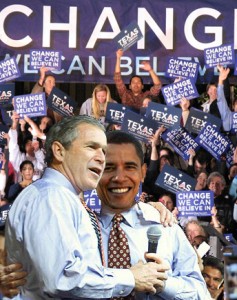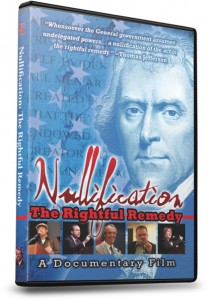 Now that the two major political parties’ conventions have ended, the 2012 presidential campaign is dominating the news.
Now that the two major political parties’ conventions have ended, the 2012 presidential campaign is dominating the news.
Although many politically savvy Americans are paying attention to the campaign-cum-horse-race, for the most part the mainstream media is ignoring a crucial question: How constitutionally important is the presidency?
In an opinion article published September 7 by the Washington Post, Kenneth C. Davis addressed that very question.
Davis, an historian and author of the New York Times bestseller Don’t Know Much About History, calls Alexander Hamilton as his first witness in the trial of the historical importance of the presidency.
“Hamilton asserted in the Federalist Papers that this experimental executive must have ‘energy’ — a quality characterized by ‘decision, activity, secrecy and dispatch.’ Hamilton knew that the times demanded bold action,” Davis writes, quoting The Federalist, No. 70.
This reading of history is correct so far as it goes. However, in studying the record of the debates and resolutions made at the Constitutional Convention of 1787 one discovers that the array of powers granted to the president in the Constitution were approved by the delegates to the convention with the understanding that the president would be elected by Congress and would not be eligible for re-election. It was only in the last few harried days of the convention that the power of electing the president was given to the people (through the electoral college) and the length of the possible term of office was unrestricted. This is a significant event in our constitutional history and one largely overlooked except by antifederalists who opposed ratification of the Constitution.
Governor George Clinton of New York wrote a very prescient warning regarding the danger latent in the office of the presidency as defined by the Constitution.
He will be surrounded by expectants and courtiers, his power of nomination and influence on all appointments, the strong posts in each state comprised within his superintendence and garrisoned by troops under his direction, his control over the army, militia, and navy, the unrestrained power of granting pardons for treason which may be used to screen from punishment those whom he had secretly instigated to commit the crime and thereby prevent discovery of his own quiet, his duration in office for four years; these and various other principles evidently prove the truth of the position that if the president is possessed of ambition, he has power and time sufficient to ruin his country.
And:
Experience ought to teach you that when a man is at the head of an elective government, invested with great powers and interested in his re-election, in what circle appointments will be made, by which means an imperfect aristocracy bordering on monarchy may be established.
Davis echoes this warning, this time calling Ben Franklin to the stand:
Powers implied or never imagined by the framers have been exerted and buttressed, often with congressional and judicial acquiescence. But the three-way tug-of-war between the branches has averted what those framers dreaded most, as Franklin warned: “The executive will always be increasing here, as elsewhere, till it ends in monarchy.”
What of this trajectory toward tyranny fueled by an executive branch bent on usurpation? As with so many other threats to our Republic, a recourse to the Constitution provides a solution.
Here is a list of the constitutional powers of the president:
Art. I, Sec. 7:
• Power to approve or veto Bills and Resolutions passed by Congress.
Art. I, Sec. 9:
• Power to write checks pursuant to Appropriations made by law
Art. II, Sec. 1:
• President has the “executive power.”
• The President’s Oath of Office — to “preserve, protect and defend the Constitution of the United States.”
Art. II, Sec. 2:
• President is the Commander in Chief of the armed forces
• President may require the principal Officers in the executive agencies to provide written opinions upon the duties of their offices.
• President may grant reprieves and pardons for offenses against the United States, with the exception of impeachment.
• President may make Treaties — with the advice and consent of the Senate.
• President may nominate ambassadors, other public ministers and consuls, federal judges, and various other officers — with the advice and consent of the Senate.
• President may make recess appointment which expire at the end of the next congressional session.
Art. II, Sec. 3:
• President must periodically advise Congress on the State of the Union, and authorizes the President to recommend to Congress such measures as he deems wise.
• President may, on extraordinary occasions, convene one or both houses of Congress and if both houses can not agree on when to adjourn, he is authorized to adjourn them to such time as he deems proper.
• President must receive Ambassadors and other public ministers.
• President must take care that the laws be faithfully executed.
• President must commission all the officers of the United States.
That is an exhaustive list. No president may constitutionally set any agenda outside of this very narrow range of powers. Likewise, Congress may not permit the president to act outside the constitutional sphere of his authority.
Next, consider the presidential Oath of Office. In that oath the president solemnly swears to “preserve, protect, and defend the Constitution.” Part of that duty must include vetoing any unconstitutional bill passed by Congress.
This responsibility must be read in conjunction in with Article VI that mandates:
This Constitution, and the Laws of the United States which shall be made in Pursuance thereof; and all Treaties made, or which shall be made, under the Authority of the United States, shall be the supreme Law of the Land.
If the president were to sign a bill into law that is not made in pursuance of the powers granted to Congress by the Constitution, then he violates his oath.
Hamilton plainly made this point in The Federalist, No. 33:
But it will not follow from this doctrine [that laws passed by Congress are the Supreme law of the land] that acts of the large society which are NOT PURSUANT to its constitutional powers, but which are invasions of the residuary authorities of the smaller societies, will become the supreme law of the land. These will be merely acts of usurpation, and will deserve to be treated as such.
Today, we have become accustomed to the president routinely signing unconstitutional usurpations of power into law, the National Defense Authorization Act (NDAA) being the latest and most frightening example.
Finally, in this time of presidential election it is critical to remember that there is no power given to the president by the Constitution to issue “executive orders” that become the “law of the land.” Executive orders, so called, are permitted only to manage matters related to the exercise of the president’s enumerated powers, such as instructing members of the executive branch on how to carry out their constitutionally approved duties.
No other use of an executive order is permitted by the Constitution, despite the unprecedented concentration of power attempted in President Obama’s executive orders: control of the Internet, control of the communications infrastructure, control of the food supply, contracting the right to assemble, declaring peacetime martial law, etc.
Davis is correct. We have ceded great and unintended power to the executive. The media’s preoccupation with the presidential candidates and their campaigns makes the office seem more important than it was intended to be.
There remain two powerful checks on the executive branch’s absolutist aim: First, strengthening the states. Madison and most of his fellow founders considered the states the “bulwark of liberty.” The states possessed of the lion’s share of power under the Constitution.
Second, the Constitution creates an executive branch that is relatively weak compared to Congress, and members of the legislative branch should stop surrendering power to the president.
As the ultimate sovereigns, the people may deploy these two weapons in the war against despotism by electing congressmen dedicated to adhering strictly to the Constitution’s separation of powers and by electing fearless state legislators committed to stopping all federal overreaches at their state borders through bills nullifying these acts.
Originally published at The New American Magazine
- The Petition of Right: Essential Part of American History - April 5, 2024
- The Ides of March: George Washington Quells a Coup - March 18, 2024
- William Dawes: A Literally Unsung Hero of American Liberty - March 5, 2024

